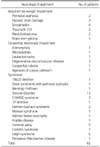Abstract
Purpose
This study aimed to assess the long-term clinical outcome of laparoscopic Nissen fundoplication (LNF) in children according to their neurologic status.
Methods
The study retrospectively analyzed the data of 82 children (62 neurologically impaired and 20 neurologically normal children with primary gastroesophageal reflux disease) who had undergone LNF between 2003 and 2012. The main outcome measures were the occurrence of recurrence that required reoperation and post-procedure complications such as infections, pneumonia, and gastrointestinal complications including ileus, dysphagia, and delayed gastric emptying.
Results
The median age at the time of the LNF was 25 months (range, 1-192 months), and the median of body weight was 10.0 kg (range, 2.8-37.0 kg). The average weight gain was 1.55±1.68 kg at 6 months, 3.32±2.30 kg at 1 year, and 5.63±4.22 kg at 2 years after surgery. Six (9.7%) of the 62 neurologically impaired patients and two (10.0%) of neurologically normal lost their body weight or had no weight changes. Eight (12.9%) of the 62 neurologically impaired children had required redo surgery because of gastroesophageal reflux disease recurrences, while 2 (10.0%) of the 20 neurologically normal children had experienced recurrences. In the neurologically impaired children, the postoperative complications included pneumonia (n=1), wound infection (n=1), urinary tract infection (n=1), dysphagia (n=1), delayed gastric emptying (n=1), and ileus (n=2). All of these complications were not found in the neurologically normal group, except for only one case of infectious colitis. However, there was no statistically significant difference between the two groups in postoperative complications.
Figures and Tables
References
1. Mattioli G, Esposito C, Lima M, Garzi A, Montinaro L, Cobellis G, et al. Italian multicenter survey on laparoscopic treatment of gastro-esophageal reflux disease in children. Surg Endosc. 2002; 16:1666–1668.

2. Martinez DA, Ginn-Pease ME, Caniano DA. Sequelae of antireflux surgery in profoundly disabled children. J Pediatr Surg. 1992; 27:267–271. discussion 271-3.

3. Flake AW, Shopene C, Ziegler MM. Anti-reflux gastrointestinal surgery in the neurologically handicapped child. Pediatr Surg Int. 1991; 6:92–94.

4. Pearl RH, Robie DK, Ein SH, Shandling B, Wesson DE, Superina R, et al. Complications of gastroesophageal antireflux surgery in neurologically impaired versus neurologically normal children. J Pediatr Surg. 1990; 25:1169–1173.

5. Esposito C, Van Der Zee DC, Settimi A, Doldo P, Staiano A, Bax NM. Risks and benefits of surgical management of gastroesophageal reflux in neurologically impaired children. Surg Endosc. 2003; 17:708–710.
6. Nam SH, Kim DY, Kim SC, Kim IK. Laparoscopic nissen fundoplication in children for treatment of gastroesophageal reflux disease. J Korean Assoc Pediatr Surg. 2007; 13:13–22.

7. Diaz DM, Gibbons TE, Heiss K, Wulkan ML, Ricketts RR, Gold BD. Antireflux surgery outcomes in pediatric gastroesophageal reflux disease. Am J Gastroenterol. 2005; 100:1844–1852.





 PDF
PDF ePub
ePub Citation
Citation Print
Print






 XML Download
XML Download